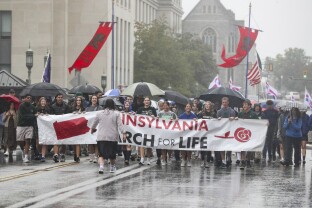A Republican candidate in a tight House race is attempting to moderate his support for restriction on abortion — by using a strategy that comes straight from anti-abortion advocates, even as Republicans try to distance themselves from such groups.
Republicans across the country have tried to moderate their stance on abortion in 2024, repeatedly shifting their messaging as they struggle to navigate the topic: They’ve opposed a federal abortion ban, borrowed terminology from the abortion rights movement, tried to pivot the conversation to IVF and avoided talking about it. Pennsylvania state Rep. Ryan Mackenzie is taking another path altogether.
Mackenzie, who is challenging Democratic Rep. Susan Wild, voted in support of a state bill that would have restricted abortion at 20 weeks in 2017. The bill didn’t pass, but in a public meet-and-greet in Bethlehem, Pennsylvania, held last week, he said that such a restriction is not a “ban,” according to an audio recording from the event obtained by NOTUS.
“A number of years ago, there was a proposal to take it from 24 weeks down to 20. Would have left everything else the same … so it would have been 20 weeks with the exception for life of the mother after that,” Mackenzie — a top candidate for the National Republican Congressional Committee — said at the event. “Susan Wild characterizes it for the 20 weeks, she calls that a ‘ban.’ So, in their language, ‘Ryan Mackenzie is for a ban on abortion.’ And you’re like, we voted to allow it up until 20 weeks, like that’s halfway through the pregnancy. It’s not, you know, but they say it’s a ‘ban.’”
Anti-abortion advocates have long held that anything other than a total ban on abortion is not a ban and instead have used words like “standard,” “limit” or “protection.” The movement overall is trying to move away from the word “ban,” arguing that voters react negatively to it.
Some anti-abortion advocates are now experimenting by advocating for restrictions without explicitly calling for a prohibition. In Nebraska, for example, activists are attempting to defeat an abortion rights state ballot initiative with a dueling anti-abortion measure that says it will protect “unborn children” from “abortion in the second and third trimesters,” rather than seeking support for a “restriction,” “ban” or a “prohibition,” the first such ballot initiative of its kind. Mackenzie’s argument — that the 20-week restriction he supported is not a ban — echoes this strategy.
Activists see this as a potential win to replicate in other states as the anti-abortion movement has faced losses on the ballot since Roe v. Wade was overturned. The language change appears to be persuasive with voters, with an August poll showing more support for the anti-abortion measure than for the initiative that looks to codify abortion rights.
Mackenzie’s campaign did not specifically respond to questions on anti-abortion groups’ language but told NOTUS that the GOP candidate was responding to Wild’s “misleading and intentionally deceptive campaign statements and advertisements,” per a statement from campaign manager Andres Weller.
“As Ryan noted, the proposed legislation he is being attacked for would have allowed abortions up until the 20th week of pregnancy and maintained the same exceptions that are in the current state law. Ms. Wild intentionally tries to deceive voters by using the term ‘ban’ with no mention that abortions would be allowed up until the 20th week and with current legal exceptions thereafter,” Weller said.
Democrats say Mackenzie is misleading voters by moderating his stance on a state abortion restriction.
“To claim that these abortion bans weren’t ‘bans’ is insulting to women across Pennsylvania who would’ve been left unable to access necessary reproductive health care if Ryan Mackenzie had gotten his way,” said Natalie Gould, a spokesperson for Wild’s campaign.
Aidan Johnson, a spokesperson for the Democratic Congressional Campaign Committee, also said it was “insulting” for him to resort “to telling Pennsylvania women what is and isn’t a restriction of their reproductive rights.” (The NRCC declined to comment for this story.)
Weller, instead, said it was Wild who “cravenly deceive[s] voters,” adding that she has supported Sen. Bob Casey, a once self-described “pro-life Democrat” who supported a federal 20-week abortion restriction in 2018. The senator, who is currently running for reelection, has since shifted his position, now supporting codifying Roe’s protections into law.
Mackenzie touted his “solid pro-life record” in 2022. But this election cycle, he has distanced himself from the topic, including by scrubbing his website of any anti-abortion language.
The Pennsylvania Republican is currently polling slightly behind Wild.
—
Oriana González is a reporter at NOTUS.
Sign in
Log into your free account with your email. Don’t have one?
Check your email for a one-time code.
We sent a 4-digit code to . Enter the pin to confirm your account.
New code will be available in 1:00
Let’s try this again.
We encountered an error with the passcode sent to . Please reenter your email.


